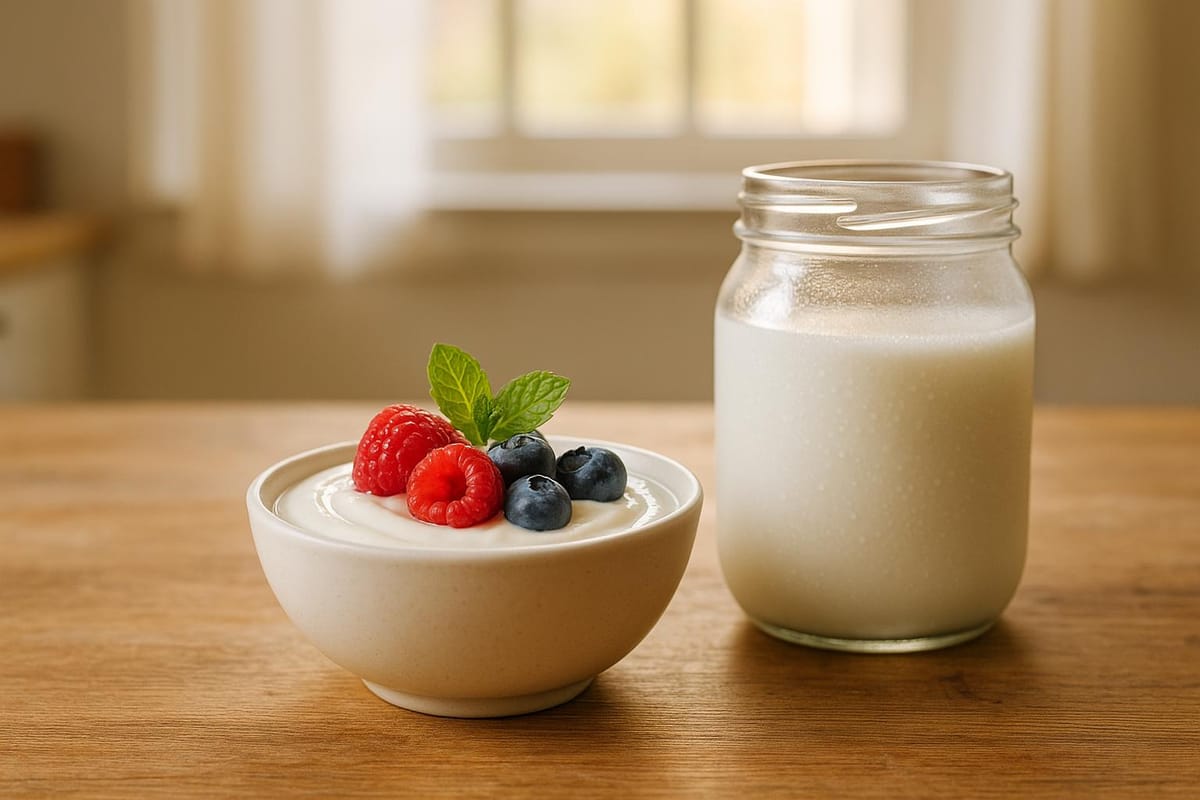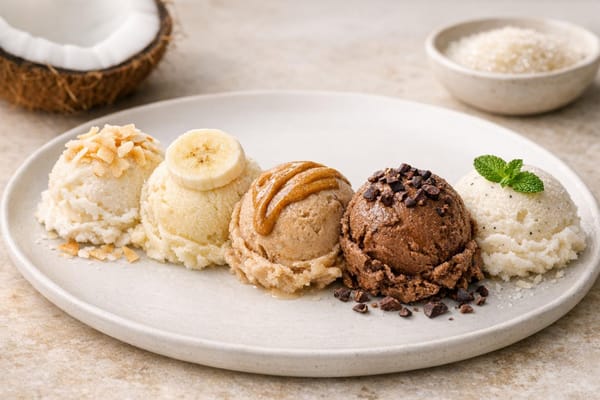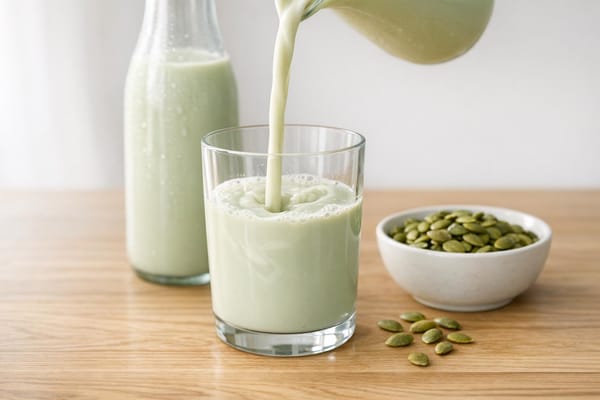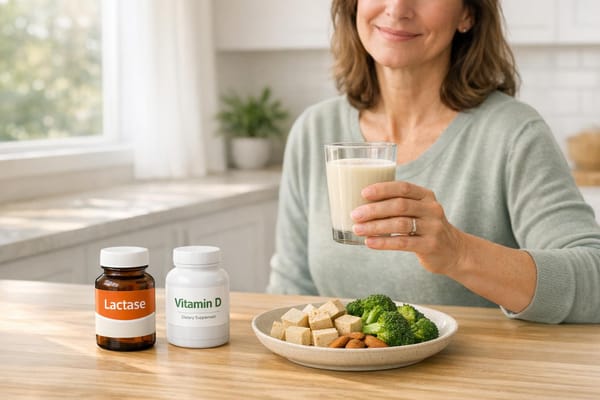How Fermented Dairy Affects Gut Inflammation
Fermented dairy supports gut health by reducing inflammation and improving digestion through probiotics and lower lactose levels.

Fermented dairy can help reduce gut inflammation and improve digestion. Here's why:
- Probiotics: Fermented dairy contains live bacterial cultures like Lactobacillus and Bifidobacterium that balance gut bacteria and lower inflammation.
- Lower Lactose: Fermentation reduces lactose levels, making these products easier to digest, especially for those with lactose intolerance.
- Enzymes: Fermented dairy boosts enzyme activity (lactase, protease, lipase), aiding digestion and reducing discomfort.
- Inflammation Markers: Studies show regular consumption lowers markers like C-reactive protein (CRP) and pro-inflammatory cytokines.
Quick Tips:
- Choose plain, unsweetened options like yogurt, kefir, or aged cheese.
- Look for "live cultures" on labels.
- If lactose-sensitive, consider lactase supplements like milktab for easier digestion.
Fermented dairy isn't just good for digestion - it supports a healthier gut microbiome and helps manage inflammation.
Biological Mechanisms
Probiotic Action in the Gut
Probiotic strains found in fermented dairy products, such as Lactobacillus and Bifidobacterium, play a key role in shaping the gut microbiota. By promoting a balanced microbial environment, they help reduce the likelihood of inflammation. This activity works hand in hand with the enzymatic processes described in the following section.
Brad Bolling, Whey-fortified fermented milk for inhibiting intestinal inflammation
Research Results
Recent studies have delved into the biological mechanisms of fermented dairy products, confirming their positive effects through measurable clinical outcomes.
Inflammation Markers
Research highlights that consuming fermented dairy regularly can lower gut inflammation markers, including C-reactive protein (CRP) and pro-inflammatory cytokines. Remarkably, these reductions can be observed within just a few weeks of consistent intake.
Microbiome Changes
Fermented dairy products are shown to boost levels of beneficial gut bacteria, particularly Bifidobacteria and Lactobacillus species. This increase leads to greater microbial diversity in the gut, which may help explain the range of health benefits experienced by different groups of people.
Effects Across Different Groups
For those with lactose intolerance or chronic inflammatory conditions, fermented dairy often brings noticeable improvements in gut health. These findings highlight its potential role in easing digestive sensitivities and managing chronic inflammation.
Adding Fermented Dairy to Your Diet
Picking the Right Products
When incorporating fermented dairy into your meals, focus on products that list live cultures on their labels. High-quality options like yogurt, kefir, and cultured cottage cheese often mention specific probiotic strains, which are key for gut health. Steer clear of items with added sugars or preservatives. For the best results, go for plain, unsweetened varieties such as Greek yogurt, skyr, or cultured buttermilk. These choices not only support your digestive system but also help in managing lactose intolerance.
Handling Lactose Intolerance
Fermented dairy can be a game-changer for individuals with lactose intolerance. The fermentation process naturally reduces lactose levels, making these products easier to digest. However, some people may still need extra help. That’s where supplements like milktab come in. Taking a milktab before consuming fermented dairy can prevent discomfort. Each tablet contains a powerful blend of enzymes: 27,000 FCC units of lactase, 22,000 FCC units of protease, and 1,000 FCC units of lipase, all working together to support smooth dairy digestion.
Summary
Main Points
Fermented dairy products can be a game-changer for gut health, especially when it comes to managing inflammation. The live cultures in these foods help maintain a balanced gut microbiome and strengthen the intestinal barrier. Studies show that regular consumption, particularly of products rich in specific probiotic strains, can lower inflammatory markers.
Additionally, the bioactive compounds created during fermentation contribute to gut health by supporting the intestinal lining and encouraging the growth of beneficial bacteria. Plus, fermentation makes lactose easier to digest, which is a huge perk for those who struggle with lactose intolerance.
Next Steps
Want to incorporate these benefits into your daily life? Start small with plain, unsweetened options like Greek yogurt or kefir to see how your body responds. If you're lactose-sensitive, consider adding a lactase supplement to your routine. For example, milktab's triple-enzyme formula provides a targeted solution with 27,000 FCC units of lactase, 22,000 FCC units of protease, and 1,000 FCC units of lipase per pill.
FAQs
How do probiotics in fermented dairy help reduce gut inflammation?
Probiotics in fermented dairy products are a powerhouse for gut health and can help ease inflammation. These friendly bacteria work by balancing the gut microbiome - encouraging the growth of beneficial microorganisms while keeping harmful ones in check. This balance is crucial for a well-functioning immune system and a calmer, less inflamed digestive tract.
On top of that, the enzymes found in fermented dairy products help break down nutrients, making them easier for the body to absorb and less likely to irritate the gut lining. If you're lactose intolerant, adding a lactase supplement like Milktab to your routine can make digesting dairy much smoother and more enjoyable.
Can people with severe lactose intolerance enjoy fermented dairy without experiencing discomfort?
Fermented dairy products like yogurt and kefir can be a gentler option for people with lactose intolerance. The fermentation process lowers the lactose content, and the probiotics found in these products may help with digestion and even ease inflammation in the gut. That said, how well someone tolerates these products can differ from person to person, as well as between different types of fermented dairy.
For individuals with more severe lactose intolerance, lactase supplements such as Milktab can be a game-changer. These supplements help break down any leftover lactose, allowing you to enjoy dairy without discomfort. It’s always a good idea to check in with a healthcare provider to figure out what suits your digestive system best.
Which fermented dairy products are best for supporting gut health and reducing inflammation?
Fermented dairy products like yogurt, kefir, and certain cheeses can be a great addition to your diet if you're looking to support gut health and manage inflammation. These foods are packed with probiotics - the friendly bacteria that help maintain a healthy gut microbiome - and enzymes that make digestion easier. To get the most out of these foods, choose products labeled with 'live and active cultures.'
For those who are lactose intolerant but still want to enjoy the benefits of fermented dairy, a high-quality lactase supplement, such as milktab, can be a game-changer. These powerful lactase pills break down lactose effectively, making dairy easier to digest. This way, you can enjoy the gut-friendly perks of fermented dairy without any discomfort.



